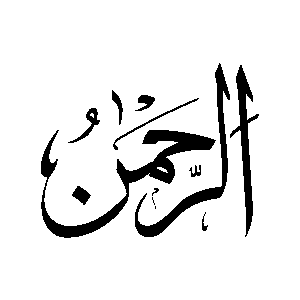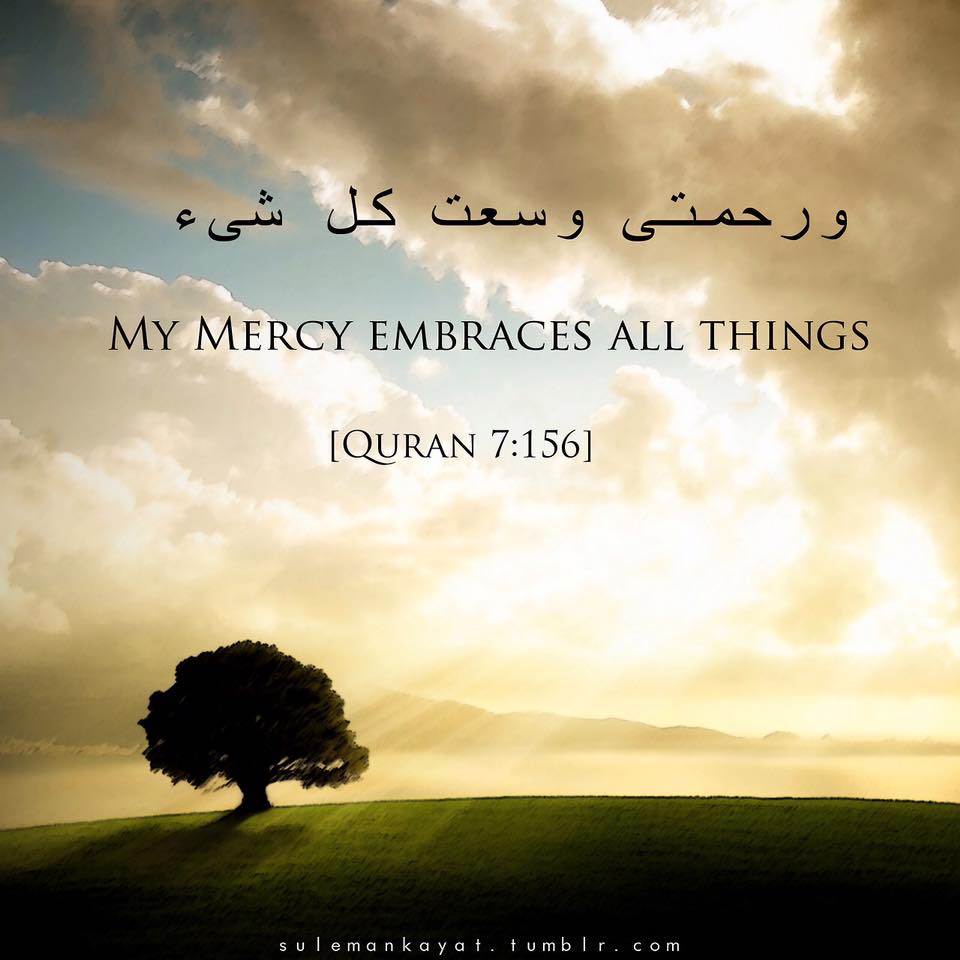The Most Gracious, The Most Compassionate/ The Most Merciful

Al RAHMAN AL RAHEEM
الرحمٰن الرحيم
And they are two majestic names that are frequently mentioned in the Noble Qur’an.
Allah, the Exalted, said:“And your god is one God. There is no deity except Him, the Ever Merciful, the Especially Merciful.”
[Al-Baqarah: 163]
The name Ar-Rahmān (The Ever Merciful) is derived from the Arabic linguistic pattern (fa‘lān), which denotes a permanent, inherent, and intensive attribute.
To further give an example, It’s like the difference between saying “someone does something” and “someone does it all the time.” This indicates that Allah’s mercy is constant, comprehensive, and all-encompassing, extending to all creation throughout this world. believers and disbelievers alike. It is His Mercy that allows even a disbelieving woman to have a safe and normal childbirth, or enables the healing of the sick. This mercy is general and extends to everyone, regardless of their fait
{The Ever Merciful (Allah) Istawa (rose over) the (Mighty) Throne (in a manner that suits His Majesty)}
Surah Ṭā‑Hā (Chapter 20), Verse 5
The Name Ar-Rahīm ( The Especially Merciful ) refers to the One whose mercy is especially His mercy in the Hereafter is manifold greater than that which He has bestowed in this world. For the believers in this life and the hereafter, i.e. this type of Special Compassionate Mercy is specifically reserved for His believing servants.
And if you want to understand this, then reflect on the words of the Exalted: {And He was, to the believers, Especially Merciful} [Al-Ahzab: 43].
And His words: {Indeed, He is to them Kind and Especially Merciful} [At-Tawbah: 117].
This indicates that this type of mercy is specific to the believers.
And there is no occurrence of The Name Ar-Rahmān ( Entirely Merciful to His servants) nor (Entirely Merciful to the believers).
Ibn al-Qayyim (may Allah have mercy on him) said:
“Ar-Rahmān refers to the attribute of mercy that is intrinsic to Him, while Ar-Rahīm refers to its connection to those whom He shows mercy to. So the first is related to the attribute itself, and the second to the act of showing mercy.”
From the manifestations of Allah’s mercy:
Narrated Umar ibn Al-Khattab (may Allah be pleased with him): Some captives were brought to the Messenger of Allah (peace and blessings be upon him), and among them was a woman searching for her child. In the narration of Al-Bukhari: she was running about, and whenever she found a child among the captives, she would take him, hold him close to her chest, and breastfeed him. The Messenger of Allah (peace and blessings be upon him) said to us: “Do you think this woman would throw her child into the fire?” We said: “No, by Allah! Not if she is able to stop it.” Then the Messenger of Allah (peace and blessings be upon him) said: “Allah is more merciful to His servants than this woman is to her child.” Agreed upon
Abu Huraira reported Allah’s Messenger (ﷺ) as saying:
Messenger of Allah (ﷺ) said, “Allah has divided mercy into one hundred parts; and He retained with Him ninety-nine parts, and sent down to earth one part. Through this one part creatures deal with one another with compassion, so much so that an animal lifts its hoof over its young lest it should hurt it”.
Another narration is: Messenger of Allah (ﷺ) said, “Allah has one hundred mercies, out of which He has sent down only one for jinn, mankind, animals and insects, through which they love one another and have compassion for one another; and through it, wild animals care for their young. Allah has retained ninety-nine mercies to deal kindly with His slaves on the Day of Resurrection.”[Agreed Upon].
The mercy of a mother,,,A mother, with her great mercy toward her child, is in fact only a part of that single mercy which Allah sent down to the earth.Her mercy is therefore limited, and also tied to a need — she needs to be merciful to her children, so she sacrifices herself for them, worries for them, and stays up sleepless nights when they are sick. All this shows that her mercy, though immense, is deficient and imperfect.But Allah does not “need” to be merciful; He is completely Self-Sufficient. Mercy is an eternal attribute of His essence, free from any deficiency or limitation. His mercy encompasses everything, while the mercy of a mother barely encompasses her children.
And to Allah belongs the highest example.
و هما اسمان جليلان كثر ورودهما في القرآن الكريم
:قال تعالى
{ وَإِلَهُكُمْ إِلَهٌ وَاحِدٌ لاَ إِلَهَ إِلاَّ هُوَ الرَّحْمَنُ الرَّحِيمُ }
[ البقرة: 163 ]
اسم الرحمن جاء على وزن (فعلان) الدال على الصفة الثابته اللازمة الكاملة، يدل ذلك على رحمة الله الواسعة التي تحيط بكل الخلق في هذا
العالم، سواء كانوا مؤمنين أو غير مؤمنين. فبفضل رحمته التامة، تُمنح حتى المرأة الكافرة نعمة الولادة السليمة والآمنة، وتُشفى الأمراض بقدرته ورحمته. إن هذه الرحمة شاملة، لا تقتصر على فئة دون أخرى، بل تمتد إلى كل نفس في هذه الدنيا
5 : ٱلرَّحْمَٰنُ عَلَى ٱلْعَرْشِ ٱسْتَوَىٰ} طه}
الرحيم : الراحم لعباده ، اي هو ذو الرحمة للمؤمنين
اسم الرحيم يدل على صفة الله تعالى التي تتميز برحمة خاصة تُنزل على المؤمنين في الدنيا و الاخرة فهذه الرحمة وَسِعتْ كلَّ شيءٍ، ورَحمتُه في الآخِرةِ أَضعافُ ما جَعلَه في الدُّنيا، وتَكونُ لِعبادِه المؤمِنينَ
وإذا أردت فهم هذا فتأمل قوله تعالى: {وَكَانَ بِالْمُؤْمِنِينَ رَحِيمًا}[الأحزاب: 43].
وقوله تعالى:{إِنَّهُ بِهِمْ رَؤُوفٌ رَّحِيمٌ}[التوبة: 117].
و هذا يدل على أن هذه الرحمة خاصة بالمؤمنين
ولم يجىء (رحمن بعباده )، و لا (رحمن بالمؤمنين)
قال ابن القيم رحمه اللَّه: إن ( الرحمن ) دالٌ على الصفةِ القائمة به سبحانه، و( الرحيم ) دال على تعلقها بالمرحوم ( أي بمن يرحمهم اللَّه )، فكان الأول للوصف والثاني للفعل.
،،،من آثار رحمة الله
عن عمر بن الخطاب رضي الله عنه أنه قال: قدم على رسول اللَّه صلى الله عليه وسلم بسبي، فإذا امرأة من السبي تبتغي – وفي رواية البخاري -: تسعى إذا وجدت صبيًا في السبي أخذته فألصقته ببطنها وأرضعته. فقال لنا رسول الله صلى الله عليه وسلم: ( أترون هذه المرأة طارحة وَلَدَها في النار ؟ ) قلنا: لا واللَّه ! وهي تقدر على أن لا تطرحه. فقال رسول اللَّه صلى الله عليه وسلم: ( اللَّه أرحم بعباده من هذه بولدها )
متفق عليه
عَنْ أَبِي هُرَيْرَةَ رَضِيَ اللَّهُ عَنْهُ قال: سمعت رسول الله ، صلى الله عليه وسلم يقول: “جعل الله الرحمة مائة جزء فأمسك عنده تسعة وتسعين، وأنزل في الأرض جزءا واحداً، فمن ذلك الجزء يتراحم الخلائق حتى ترفع الدابة حافرها عن ولدها خشية أن تصيبه”.
”وفي رواية: ”إن لله تعالى مائة رحمة أنزل منها رحمة واحدة بين الجن والإنس والبهائم والهوام، فيها يتعاطفون، وبها يتراحمون، وبها تعطف الوحش على ولدها، وأخر الله تعالى تسعاً وتسعين رحمة يرحم بها عباده يوم القيامة” ((متفق عليه)) .
الأم برحمتها العظيمة بولدها إنما هي جزء من تلك الرحمة الواحدة التي أنزلها الله إلى الأرض فلذلك رحمتها محدودة و لأن رحمتها ليست بذاتية و لكن مرتبطة بحاجة، إذ هي تحتاج ان تكون رحيمة بأطفالها و لذلك تضحي بنفسها من اجلهم، و خوفها عليهم إذ تسهر ليالي إذا مرضوا . كل هذا يدل على نقصان رحمتها و ليس من كمالها و الله لا يحتاج ان يكون رحيماً لأنه الغني بذاته و الرحمة صفة قائمة بذاته منذ الأزل و لا يعتريها أي عجز او نقص فرحمته وسعت كل شئ و رحمة الأم بالكاد تسع أطفالها
و لله المثل الأعلى.

